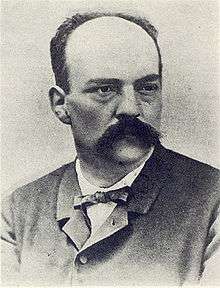Valentí Almirall i Llozer

Valentí Almirall i Llozer (Catalan pronunciation: [bəɫənˈti əɫmiˈɾaʎ]; Barcelona, 8 March 1841 – 1904) was a Catalan politician, considered one of the fathers of modern Catalan nationalism, and more specifically, of the left-winged nationalism.
Biography
He was the son of shopkeepers and studied at the School of Fine Arts in Barcelona, but had to leave for having criticized the professor Claudi Lorenzale. Did spoke Greek, Latin, French, Italian and German, and in 1863 graduated in law at the University of Barcelona. His wealth and the little vocation he had of working as a lawyer pushed him into politics. Participated in the preparation and the facts of the revolution of 1868 in Barcelona, directed the newspaper El Federalista (The federalist) and collaborated with the Federal-Republican Journal, where he published leaflets quite radicals like Guerra a Madrid! (War with Madrid), Bases para la Constitución federal de la Nación Española y para la del Estado de Cataluña (bases for the federal Constitution of the Spanish Nation and for the Catalan State), Observaciones sobre el modo de plantear la confederación en España (Observations on the way to propose the confederation in Spain). As a republican he declared himself hostile to any kind of agreement with the monarchical and took part in the Tortosa Pact (18 May 1869), signed by representatives of Republican organizations in Catalonia, Valencia, the Balearic Islands and Aragon.
Between 1868 and 1881 he was into the Federal Democratic Republican Party (PRDF) where he was the leader of the federal intransigent of Barcelona, a minority group within the federal republicanism, which is based around the Federalists Club (1868–1869), of which he was chosen to be the first president, and around the newspaper El Estado Catalán (1869–1870 and 1873). His ideas were characterized by idealism. They wanted to transform the centralized and uniforming Spanish state, into a decentralized federal state with a federal revolution from below, which emerged from the initiative of the masses, a revolution that would involve the federal division of Spanish sovereignty between the Spanish historical regions and the government of the federation.